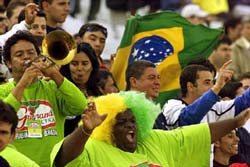World Cup apathy hits Brazil
An unprecedented wave of World Cup apathy, rather than the usual unbridled optimism, is sweeping Brazil in the run-up to the tournament at the end of this month.
Soccer is facing a huge credibility crisis off the field, while on it the team that brought the world the Beautiful Game are now in the charge of a coach known as Big Phil who publicly encourages his players to foul their opponents and chastises them for not doing enough time-wasting.
The sport used to be an escape valve for many Brazilians from their daily grind of injustice, poverty and violence. Four World Cup triumphs had made the national team a source of pride.
 Now, football directors, accused of plundering the game, are vying with politicians in the unpopularity states.
Now, football directors, accused of plundering the game, are vying with politicians in the unpopularity states.
If that were not bad enough, Brazil's matches will be played at the crack of dawn, a real dampener in a country where fans like to gather at barbecues to watch televised games with a beer in one hand and a large steak in the other.
"Nobody's going to invite their friends around to support the team with sleepy, creased-up faces and drinking yoghurt," Antonio Rosa Neto, president of the Dainet media consultancy group, said in a newspaper interview.
"There's no cup atmosphere and the kick-off times are terrible."
The street decorations in the team's colours of yellow and green which usually appear months before the start of the World Cups are this year startlingly absent.
A survey carried out by the Ibope institute found that 77.5 percent of interviewees did not plan to buy World Cup-related products. Twelve percent said they would not watch Brazil's matches and 42 percent said they would not tune in to games not involving Brazil.
And Brazilians, who usually expect their team to win the cup as a matter of course, after victories in 1958, 1962, 1970 and 1994, are this time happy to admit that arch-rivals Argentina are the favourites.
Having seen their own team use more than 60 players in 18 World Cup qualifiers, many Brazilians now look in envy at the more settled Argentine side.
LOST FAITH
Brazil coach Big Phil, full name Luiz Felipe Scolari, admitted recently that Brazilians may have lost faith in a team which used four coaches in the qualifiers and pulled through only with a lucky win over Venezuela in their final game.
"It's up to us to restore some faith in the team so that the public get more enthusiastic," he said.
The team alone, however, are not the only problem.
Last year, two Congressional inquiries into the sport ended by making wide-ranging allegations against a number of leading directors, including Ricardo Teixeira, president of the Brazilian Football Confederation (CBF).
Teixiera, who has run the CBF since 1989, was accused by the final report of one inquiry of mixing CBF and personal business, donating CBF money to politicians and living a life of luxury at the CBF's expense.
The report added that if the CBF were a private company, it would be bankrupt.
The directors of a number of leading clubs were also accused in the report of crimes such as tax evasion and illegally pocketing their clubs' money.
CLINGING ON
Yet, in a country where impunity is a widespread concern, the directors named in the report, including Teixeira, have managed to cling on to their posts.
Since then, feuding among directors has further alienated public opinion.
The World Cup in South Korea and Japan comes as a legal battle rages over this year's Brazilian championship, which is due to start in August.
On the one hand, a group of leading clubs want to set up their own league. On the other, the CBF, backed by the clubs from Rio de Janeiro, wants to keep control of the tournament.
Commentators believe these problems have rubbed off on the national team and Brazil will go into the World Cup after a dismal 18-month period in which they have suffered unprecedented defeats against teams such as Ecuador, Bolivia, Honduras and Australia.
Scolari's ultra-cautious tactics, and his refusal to pick charismatic veteran striker Romario, have not helped to muster enthusiasm and his team's style has been dubbed "Bullyboy football" by the media.
In a country where many people were brought up watching the sublime skills of Garrincha, Pele and Rivelino, few have been able to get excited about a team which fields up to five defenders and two tackling specialists in midfield.
Scolari encouraged his team to foul their opponents before last year's World Cup qualifier in Argentina and, after the game ended in a 2-1 defeat, complained that his players should have done more time-wasting, even if it meant being booked.
Former national team coach Tele Santana points out that the sheer number of matches played by Brazil is water in the beer for the country's fans.
In the last year, Brazil have played in a devalued Copa America and the much-criticised Confederations Cup as well as a plethora of friendly internationals, often on dates when neither they nor their opponents were able to bring top players.
Panama, ranked 112th in the FIFA rankings at the time, came to Brazil for a friendly last August while in March the former world champions took on what was effectively Iceland's B team.
"When the Brazil team played, it used to be the cause of a huge celebration," remembered Santana, who coached the team at the 1982 and 1986 World Cups.
"Nowadays, the team plays so often that their games have become banal."